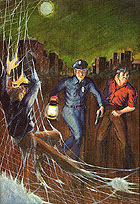The following posts include (1) "footnotes" for The Doris Piserchia Website (link at left), (2) texts-in-process that will eventually appear there, (3) texts from other websites, and (we hope) (4) stimulating discussion threads. The picture to the left is the back cover of The Spinner (book club edition), depicting a citizen of Eastland "hanging out" while Ekler the cop and Rune the idiot-superman look on.
View current page
...more recent posts
It is supremely ironic that Doris Piserchia closed out her career the way many sci fi writers begin theirs, writing a zombie novel under a pseudonym. But what a zombie novel it is. I, Zombie (DAW, 1982), as written by Curt Selby, puts a modernist economic/political twist on the wheezing tale of the Undead among the living. A future spacefaring society has developed wetware that can be installed in the heads of the recently Dead, allowing them to be used as slave laborers in the hellholes of extraterrestrial colonization. And not just any of the Dead, but the formerly insane, the suicides, the trash that no one cares for or about. This is cast as an economic decision, as a cost saving alternative to expensive robot labor. I, Zombie is one of those books that seems to be screaming with hidden agendas, its story a thinly disguised metaphor for any of a number of societal criticisms. But this is a Piserchia book, and the reader is tempted to accept that the perceived metaphor is merely a lush setting from the author's wild imagination. This is one of the most maddening things about Piserchia's books. There are so many "almosts" in them; almost great writing, almost unique conceptualizations, almost "message" stories. It is hard to tell what exactly is going on. I, Zombie's slave laborers are mostly female, which, if it were any other book of the early 1980s, would raise an immediate red flag of feminist agenda. But this doesn't seem to be the case. Nor does the obvious political question of the institution of slavery, or the class issues of using the shells of the cast off and unprotected as human construction equipment. Piserchia seems to have used a thoroughly loaded concept in an unloaded way, as story element rather than flagpole.
But the hint of meaningful metaphor is still there, so maddeningly close to conceptualization that the reader keeps waiting for the expositive narration that will Explain All. It never comes. In a way, I, Zombie is a twist on the Robot morality story. The question of the ethics of producing a sentient laboring machine is sharply drawn, using the gimmick of not using metal and processers to produce a robot, but the cold flesh of human corpses. The ultimate twist is that the narrator, a zombie worker, is, through an incompetent accident at the Zombie factory, still alive. Not a reactivated cadaver, but a barely alive person trapped in the zombie lifestyle. This is a reflection of the primary point of robot stories stretching back to Gernsbeck and Asimov, that the Robot is redeemed and set free by the tiny flash of Humaness bestowed by intelligence. This anthropomorphic and cockeyed idea of Humanity being something that evolves at a high order of intelligence and complexity is hoakum straight out of colonialism and the White Man's Burden. Piserchia makes this idea work by having the spark of redeeming humanity be the tiny remnants of a Life destroyed. This shift of focus allows the narrative to explore the stubborn survivability of Human-ness, the ability of the Human spark to carry on within a hellish world order whose Horror knows no bounds.
I, Zombie is a peculiar coda to a peculiar career. Doris Piserchia wrote a pile of good science fiction, but never quite broke through to the popular imagination. It is almost as if the glimmer of feminine viewpoint that permeates her writing, as hard to discern as it is, was enough to scare off the pimply army of Fanboys who supply the money to keep the Baloney Factory churning out product. With an injection of overt Agenda, I, Zombie could have been a milestone book in feminist sci fi, but it was not to be. For the reader who enjoys building political meaning into their reading on their own, this book is a rich source of thought-provoking material. And who knows, maybe Piserchia wanted to make a point without beating the reader over the head, though the politics of I, Zombie are understated to the point of virtual invisibility. Whatever it is, I, Zombie is an appropriately ambiguous headstone for a completely ambiguous writing career.
--from Strange Words
